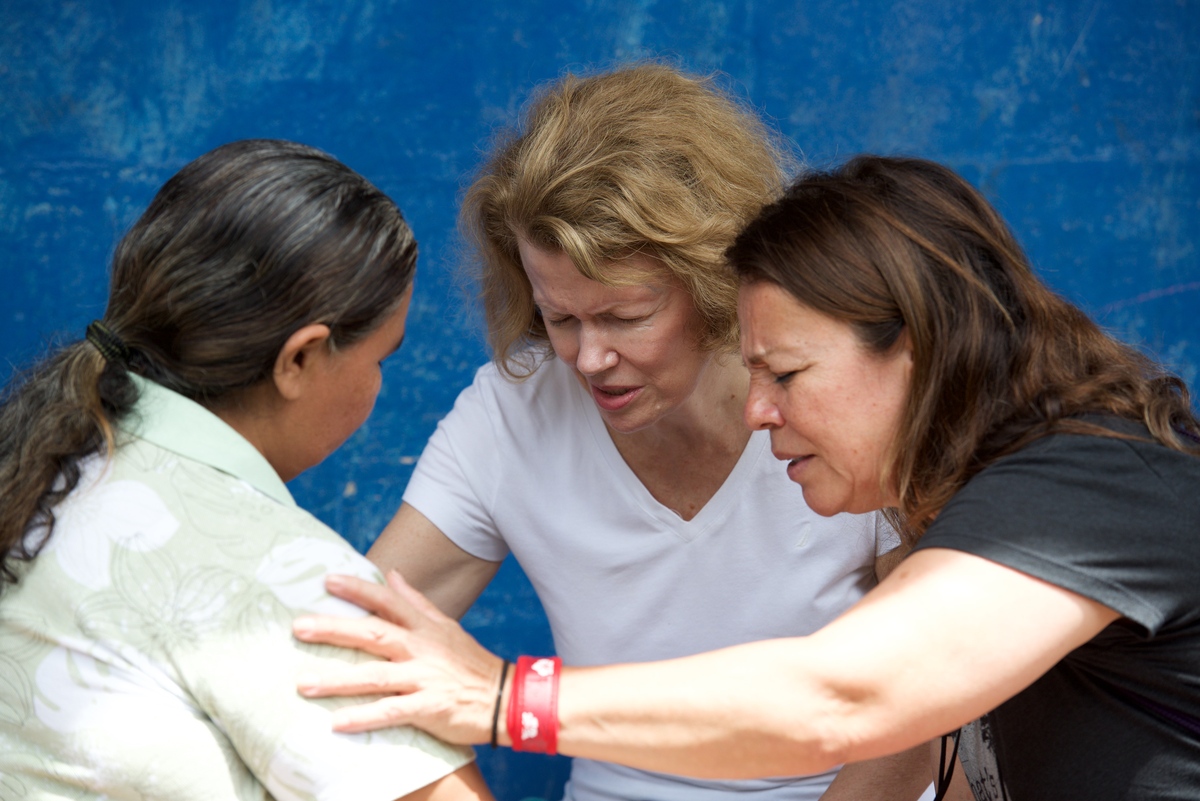One True God
América LatinaThey march in rows, swaying their hips, and swinging their arms as they approach the town square. Pointed black hats with large brims made of cardboard and leather adorn their heads. Animal skins cover their legs. They grasp clubs and chains tightly in their hands. Amid the sounds of drums, flutes, and shell horns, they shout and talk among themselves. The dance battle for the square is about to begin.
Inti Rhymi, a week-long celebration in Cotacachi, Ecuador, takes place during the summer solstice. This ceremony honors the Inca sun god, Inti. Each year, multiple indigenous communities gather to worship Inti. As they enter the square, each community tries to overpower other communities in a battle to control the square. This is no lighthearted competition; the outcome determines a community’s success. Winning secures a year of blessing from the sun god and control over the spiritual realm. Losing is not an option.
The battle for the square often turns violent. A special police force intervenes in case of excessive commotion. Some participants will die in these battles, however, a local Assemblies of God World Missions team seeks to minimize the damage and minister to the injured by bringing in a large medical team each year. This gathering mirrors Ecuador’s dark and desperate spiritual climate – yet, there is a glimmer of hope.
Witchcraft heavily influences the lives of these Northern Ecuadorians. The majority of indigenous communities look to witch doctors for spiritual healing. Syncretistic beliefs — often combining Catholicism with traditional animistic, polytheistic views— are common. Catholicism in Ecuador is unique due to its cultural and indigenous influences, differing from more well-known Catholic practices. In the Northern Highlands of Ecuador, some Catholic priests also function as witch doctors. Many communities have a Catholic church, but often, the priest is itinerant and only comes once every three to six months. In many cases, priests charge for their services. Some communities have evangelical churches, but many in the Northern Highlands are inactive.
Hostility, conflict, and anger characterize these communities. Residents become cold, reserved, and distrustful. Because of their closed-off attitude, there is restricted access to these communities.
Outsiders are not welcome. “Many communities post signs at their entrances warning outsiders to stay away, and threaten beatings for perceived offenses,” says Assemblies of God World Missions global worker, Ashley Penley. “Communities resist us because we are teaching against their indigenous religious practices and beliefs.” With minimal external influence, the communities remain isolated, inwardly focused, and largely untouched by the knowledge of the One True God.
Ashley and Meredith Penley have served Ecuador since 2010. They primarily work with the Quechua people, a large indigenous tribe scattered throughout Ecuador. In the last five years, the Penleys have established four healthy evangelical churches in the Cotacachi area. They also operate a church planting school. Four students who are pursuing credentials with the Assemblies of God. In addition to church planting and biblical education, the Penleys engage in children’s ministry, medical outreaches, and other evangelism opportunities to connect with members of indigenous communities.
The Penleys gain access to indigenous communities by connecting with community members who offer to serve as “persons of peace.” This person is generally a leader in the community. In 2020, Ashley met a boy in a supermarket who was trying to sell him blueberries. Ashley asked if he could visit the boy’s family and community. The boy warned him, “You can’t come to my community. If you do, they will severely beat or kill you.” Undeterred, Ashley began praying while driving through the boy’s community. One day, prompted by the Holy Spirit, Ashley approached a small, older Quechuan lady standing outside her home. She spoke only Quechuan, so she introduced Ashley to her grandson. He, in turn, introduced Ashley to the community president. “The president became our person of peace. He was very welcoming,” says Ashley. “The presidents want to do good things for their communities so they will get voted back in.” With the president’s permission, the Penleys brought several missions teams into the community to conduct consecutive weeks of vacation Bible school. Starting with 30 children, attendance grew to 200. “In a way, we unintentionally planted a church. It’s mostly children, but it’s still a church. It functions like one,” says Ashley. The Penleys are now focusing on discipling the children and reaching the children’s parents.
Alongside dark spiritual practices, there is a lack of medical care. Community members are often impoverished and malnourished because of limited access to nutritious food, clean water, and adequate housing.
Physical and spiritual deprivation influences behavior; physical and sexual abuse is common in these communities. An Ecuadorian social worker visited El Tablon, Ecuador, where the Penleys are also involved. During the social worker’s visit, an eight-year-old girl disclosed that her father was abusing her. The social worker intervened, advocating for the child’s relocation to a safer environment. The confrontation led to severe retaliation from the girl’s family. Her mother publicly whipped her with stinging nettles and then severely beat her for speaking out. The girl was eventually banished from her community. After hearing this news, the social worker placed her in an orphanage an hour away.
The social worker told Meredith, “Please don’t stop coming here. This place is so hard. I’ve been coming here for three years as a government worker and no amount of government assistance is going to change the hearts of these people. What they need is Jesus. They need what you guys are doing.”
The Penleys have also experienced their share of challenges. The spiritually dark atmosphere and the conflict within communities make finding community and relational support challenging. “I pray that the Lord will continue to give us grace and that we will be able to love the unlovely. It’s easy to talk with people who are friendly and want to hear the gospel. It’s hard to make sacrifices when you don’t receive love and a friendly feeling from people in return,” says Meredith.
In addition to struggling with relational support, the Penleys are operating with immense need and limited resources. Serving multiple indigenous communities, running a Bible school, and pastoring church plants require vast resources. Poverty has increased in recent years due to Ecuador’s economic decline. Church members ask the church to provide food for their families.
The Penley’s church has been robbed four times in eight months. “Because we are outsiders, and they don't really want us here, it makes it easier for people to steal from us. They’ve stolen everything. Every time we replace stolen equipment, we add more security. Neighbors will not report anything. The police don’t respond; they don’t patrol at all. When they come out to fill out reports after we’ve been broken into, they just tell us there’s nothing they can do.”
Despite these challenges, the Penleys have witnessed God’s miraculous power. Three-year-old Ariana began attending the Penleys’ church plant, El Camino, with her mother and grandmother. Meredith noticed that Ariana couldn’t walk or run like other children. She had to be carried from place to place. At the end of a service where her grandmother accepted Christ, she requested prayer for Ariana. “She’s had a hole in her heart since birth,” the grandmother shared. “I’ve been taking her to the witch doctor at the Catholic church for a long time, and he’s been trying to cure her, but nothing’s working. She’s very sick.”
The Penleys and the church prayed for Ariana. Two weeks later, she returned to church, and was running around. Later a doctor confirmed her heart was healed. “We teach that there’s only One True God,” Meredith explains. “He has never changed. He still heals like He did. He still does miracles. They believe in the spiritual, but they need to see Jesus heal.”
In another community, the Penleys brought a medical team to provide healthcare to the villagers. One woman had back problems. The pain was so severe she could hardly walk. The medical professionals told her they could only provide her with a prescription for painkillers. The Penleys, knowing God as their Healer, prayed for the woman and asked her how she felt. “I feel a little better,” she told them. They prayed four other times, explaining to her that Jesus has the power to heal. After the fourth time, she began jumping and shouting, “Look! I don’t have any pain!"
After experiencing her miraculous healing, the woman wanted the Penleys to visit her elderly, bedridden father. Her father only spoke Quechuan. Ashley tried to minister to him. After struggling with the language barrier, Ashley asked the woman if she could translate as he prayed. The woman agreed and Ashley began praying.
“I started to pray in tongues over him, and my prayer language completely changed while I was praying. This man started to smile and he grabbed my hands. His face lit up. The woman told us afterward that I was praying in Quechua. I don’t know Quechua. I’ve never studied it,” says Ashley. Through the Holy Spirit’s power, Ashley’s prayer language changed so the man and his daughter could hear Ashley’s conversation with God — and witness a miracle — and provide opportunity for him to hear more about the One True God.
Community by community, the Penleys are proclaiming Jesus to a reserved, closed-off, and underreached people. These people are discovering God — an unchanging, miracle-working, powerful, healing God who can provide for every physical and spiritual need. Starting with the children, the Penleys are reaching the next generation of these indigenous communities with the knowledge of the One True God and discipling the children and adults out of darkness and into light.
By Holly A.V. Knapp






















